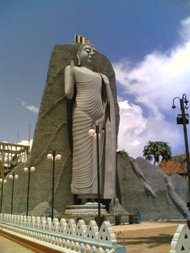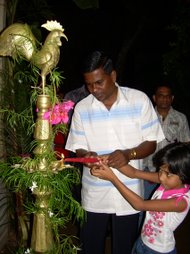English literature could fill the vacuum
By S H Mithrapala Retired principal (SLES)
 There are some valid reasons for reintroducing English literature to the school curriculum. No one can dispute the fact that the English language enjoys a privileged place in Sri Lanka. It is an international language. Though it is said to be a foreign language it is not foreign to the extent that languages like Russian, Chinese, Korean, etc are to Sri Lankans.
There are some valid reasons for reintroducing English literature to the school curriculum. No one can dispute the fact that the English language enjoys a privileged place in Sri Lanka. It is an international language. Though it is said to be a foreign language it is not foreign to the extent that languages like Russian, Chinese, Korean, etc are to Sri Lankans.
In the recent past computer science has become an indispensable subject. Also innumerable developments take place in scientifically and technically developed counties everyday. If we Sri Lankans are to pick up these latest findings, to keep pace with other countries that are making advances, the knowledge of English language is essential.
In this brief article I wish to highlight as to why we should revive the teaching of English literature to our students in schools. Since 1956 there has been a downward trend with regard to the teaching of English in our schools consequent to the Official Languages Act passed in parliament making Sinhala the official language of this country.
Therefore even at this late stage it is imperative that some meaningful and constructive steps are taken to rectify this pathetic plight of Sri Lankan students of not so affluent families due to a shortcut taken by certain power hungry politicians.
In Sri Lanka, then known as Ceylon, the situation with regard to the system of education under British rule was very much different from that of today. For whatever reasons that motivated them, a prominent place had been given to the English language by making it the medium of instruction in the few schools managed and supervised by the missionary educationists. Along with the handful of English medium schools there existed a large number of vernacular schools during that time.
In all missionary schools, the medium of instruction was English while in the vernacular schools it was either Sinhala or Tamil. The student who studied in Sinhala or Tamil was hardly exposed to English. The English medium students thus had a terrific advantage over their vernacular counterparts for whom the opportunities to learn the English language were limited and in some schools not available at all. Even at present, in most schools there is only one period in the school timetable to teach the English language in an appropriate, effective and useful manner.
Remedy
When W J M Lokubandara was the minister of education and higher education under the UNP government, an effort was made to arrest the downward trend of the teaching of English in our schools. With the whole-hearted support of the then cabinet ministers, the minister of education was instrumental in introducing a number of far reaching measures to improve the teaching of English in our schools. Among such proposals introduced, one landmark proposal was the decision to reintroduce the teaching of English literature in GCE O/L and A/L classes. In fact it should be borne in mind that English literature was taught before 1956 only in the few English medium schools.
It is true that by making room for English literature in the school timetable alone students will not be able to acquire the quality of English knowledge that prevailed among the students of yesteryear, but as the good old saying goes it is better to have something rather than having nothing at all.
Some chosen texts of English literature were recommended for the teaching of English literature in our schools. The books recommended were to teach prose, poetry, drama and fiction.
Along with the use of the recommended books and other recommended changes to the school curriculum implemented, there should have been some appreciable improvement in the quality of knowledge of our students. But due to some unfortunate and unforeseen circumstances and reasons the plans of Lokubandara had been altered or some parts abandoned totally.
To improve the English knowledge of our students, the planners of the project believed that the knowledge of English of the teachers of English should also be improved. This was intended at the time mainly for uncertificated teachers of English who constituted a sizable proportion. With the financial backing of the World Bank the project to improve the quality of English knowledge of the then uncertificated teachers of English was commenced under the guidance of the then Secretary of Education and Higher Education Mr R I T Alles. At the commencement, this project had thirty training centres in selected areas. The programme differed in one aspect from that of other similar training programmes that the ministry conducted at that time. The trainers or tutors of these classes that were conducted during weekends were selected from retired English school teachers.
By re-introducing English literature into the school curriculum the planners were optimistic that the students would be more exposed to English than they were before. The planners were certain that by improving the quality of the knowledge of English of the teachers its cumulative effect would invariably benefit the students in the schools.
International schools
During the last two decades so called international schools have mushroomed in Colombo and even in Kandy, Galle and Ratnapura, and a host of others and these institutions are supposed to be playing the role played by the missionary schools. Most of the subjects are taught in the English medium and therefore the students in these schools are more exposed to the English language than their counterparts in state schools and such.
As it is impossible for the vernacular schools to revert back to the English stream, this vacuum could be filled at least to a certain extent by reintroducing the teaching of English literature which would definitely contain the deterioration of the knowledge of English of our students, both Tamils as well as Sinhalese.
In this effort to arrest the deterioration of the standard of English almost all English language teachers should be periodically retrained, supervised and their teaching activities monitored. The teachers themselves should make an honest effort to make a constructive contribution to the nation by doing their best to improve the standard of English of the present day student.
It is quite appropriate to conclude these observations by quoting the much repeated statement of the former Secretary of Education R I T Alles, Vedamahattaya merenna issara wattoruwa golayata denna ona - the physician should hand over the prescription (the knowledge of English in this context) to his student before his death.





















































No comments:
Post a Comment